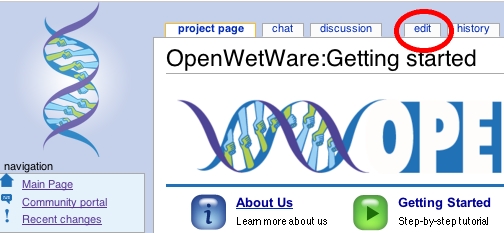OpenWetWare:Getting started: Difference between revisions
No edit summary |
No edit summary |
||
| (178 intermediate revisions by more than 100 users not shown) | |||
| Line 1: | Line 1: | ||
{{OpenWetWare:Getting started/Introduction}} <!-- PLEASE DO NOT MAKE EDITS TO THIS PAGE! If you would like to make test edits, please refer here: http://openwetware.org/wiki/Sandbox --> | |||
Testing! | |||
Revision as of 18:11, 14 August 2014
What is OpenWetWare?
OpenWetWare is an effort to promote the sharing of information, know-how, and wisdom among researchers and groups who are working in biology & biological engineering. Lots of people are constantly improving OpenWetWare, making frequent changes, all of which are recorded on article histories and recent changes.
The first step, if you haven't done so already, is to set up a user account so you can edit pages.
How can I help?

Don't be afraid to edit—anyone can edit almost any page, and we encourage you to be bold (but please don't vandalize)! Find something that can be improved, either in content, grammar or formatting, and fix it.
You can't break OpenWetWare. Anything can be fixed or improved later. So go ahead, edit an article and help make OpenWetWare the best information source on the Internet!
Make your first edit right now:
Test edits...
Testing!